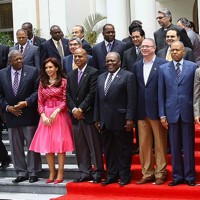CARTAGENA, Colombia -- The Organization of American States prides itself on being the world’s oldest regional organization. Yet, as its members prepare for the Sixth Summit of the Americas in Cartagena, Colombia, this weekend, its relevance in today’s world, especially amid Latin America’s recent wave of regionalism, will be called into question.
The OAS remains the best-organized and most inclusive body in the Western Hemisphere, and apart from bilateral relationships, it is considered the prominent link between the United States and Latin America. Nevertheless, the region’s increasingly diversified global engagement and a growing sense of autonomy among Latin American nations has raised existential questions about the long-standing body, and by the same token, about the influence of the United States in Latin America.
Perhaps the most visible challenge today comes in the form of alternative regional groupings, such as the Union of South American Nations (UNASUR), created by Brazil in 2008, or the smaller and more radical Bolivarian Alliance (ALBA), which began as an agreement between Cuba and Venezuela in 2004.

